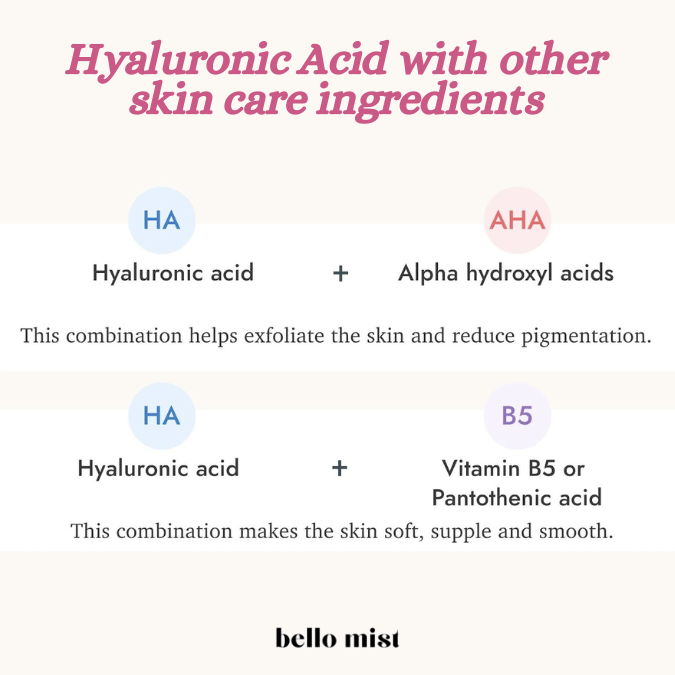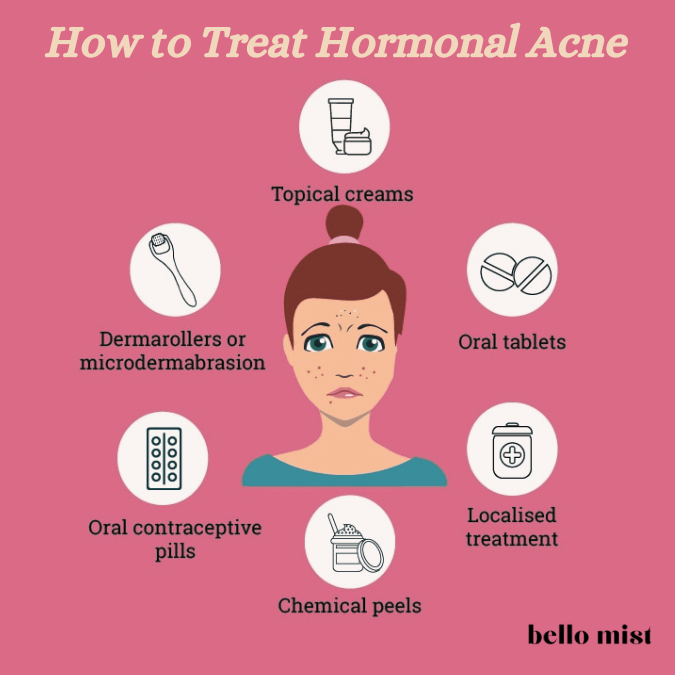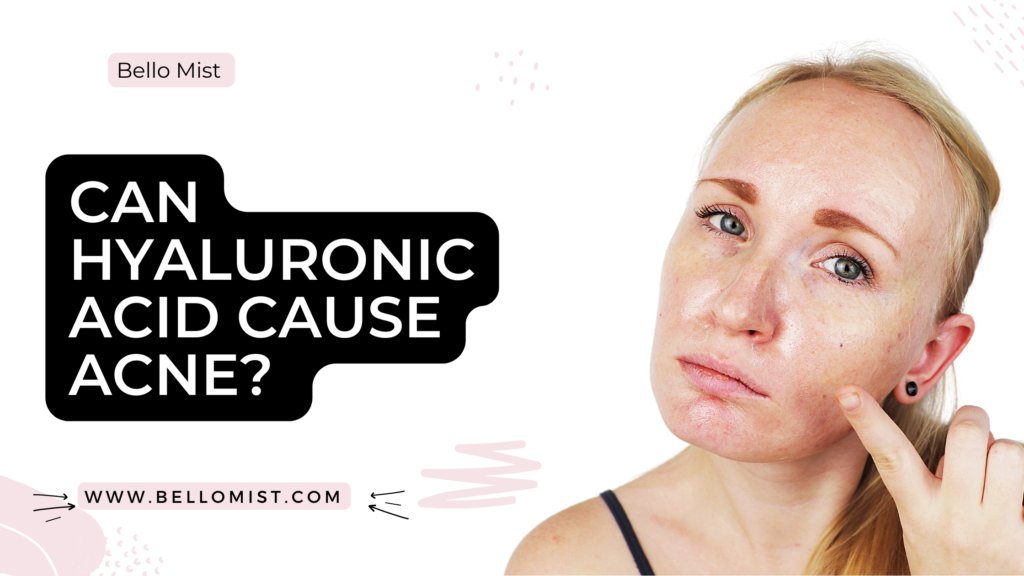Are you wondering can hyaluronic acid cause acne? You’ve come to the right place.
Hyaluronic acid has been a popular skincare ingredient for some time, and it’s easy to see why. This “non-acid” acid is known to be incredibly hydrating, holding up to 1000 times its weight in water, and it’s a fundamental component of many coveted beauty products.
But since hyaluronic acid is often advertised for dry skin, you might ask: can hyaluronic acid cause acne?
If you’re someone with acne-prone skin, you’re probably familiar with the disappointment of buying a product that claims to bring perfect, blemish-free skin, only to find out it’s comedogenic or not suitable for your skin.
So, can hyaluronic acid cause acne? Or, on the contrary, does this holy-grail ingredient help treat acne? This article will answer all your questions. Let’s get started.
Can hyaluronic acid cause acne?

Anecdotal reports suggest that specific individuals may adversely react to serums, creams, and other skincare products with hyaluronic acid. However, it’s difficult to determine if the acid or another component, like oils, is causing the breakout.
So, can hyaluronic acid cause acne? Before we answer the question, it’s essential to understand that skincare items usually can cause two sorts of adverse reactions in the skin prone to acne: purging and the traditional kind of breakouts.
Let’s discuss each adverse reaction in detail to determine if the hyaluronic acid itself is the cause of the issue.
Does hyaluronic acid cause purging?
When using certain skincare products, the skin’s cells may regenerate faster than usual – this is known as purging. As a result, whiteheads can appear on the skin’s surface and may be mistaken for a regular breakout.
This process can be caused by potent anti-acne treatments or potent chemical exfoliants, but it doesn’t necessarily reflect the product’s efficacy. The skin’s layer of protection is damaged, which causes purging.
Hyaluronic acid is a moisturizing agent, not a chemical exfoliator: it won’t cause your skin cells to regenerate. So can hyaluronic acid cause acne flare-ups? It’s unlikely that hyaluronic acid is the cause of skin purging.

Does hyaluronic acid cause breakouts?
Another kind of acne breakout you may encounter because of a skincare product is a regular, blocked-pore breakout. This can happen when the skincare product contains pore-clogging components, leading to eruptions.
These may appear similar to a ‘purging’ breakout (tiny, scattered whiteheads), but they could occur on any part of your face, not just in areas prone to breakouts.
If you had a breakout while using a hyaluronic acid product, it is doubtful that the acid itself was to blame unless it also contains an AHA, BHA, or retinoid.
If you have a regular breakout from a skincare product, the best thing to do is to stop using it and see if the issues clear up.

Is hyaluronic acid comedogenic?
In determining can hyaluronic acid cause acne, it is essential to learn whether it is comedogenic.
Hyaluronic acid is non-comedogenic, so it’s unlikely to clog up your pores and cause blemishes, but that does not guarantee that all of the products featuring this acid are great for those with acne-prone skin.
It’s essential to always read the product labels to ensure no comedogenic components are in the formula.
Many hyaluronic acid serums and moisturizers contain hyaluronic acid and comedogenic elements, so use the helpful guide below when reading the labels.

Why does hyaluronic acid cause acne?
So if hyaluronic acid is non-irritating and doesn’t cause purging, why do some people still have breakouts when using it? It could be due to the way it is used.
Humectants like hyaluronic acid draw moisture from the dermis or the atmosphere and transport it to the epidermis. But this only works if the environment is humid.
The natural moisturizing factors (NMFs) in the epidermis also pull water from the dermis into the epidermis and skin cells. If the moisture is not locked in with an occlusive product, the water drawn from the dermis can escape through the skin barrier. The use of a humectant mimics this process but to a high degree.
This can worsen in a dry atmosphere, leading to dehydrated skin. Too much use of humectants like hyaluronic acid can worsen dry skin conditions.
According to the AAD, if your skin is dry, it may produce additional oils, resulting in acne. Studies have also revealed a connection between acne and dehydration of the skin, as well as a heightened production of oil.

Can hyaluronic acid help with acne treatment?
In determining can hyaluronic acid cause acne, it is necessary to know whether it helps treat the same issue.
It’s well-known that too much oil can lead to acne. Sebum, secreted by the sebaceous glands, can become stuck in the pores, resulting in breakouts. So managing oil production can help steer clear of these blocked pores.
Recent studies have revealed that hyaluronic acid has the potential to assist in controlling sebum production, thus making it a valuable element to protect against acne.
Furthermore, people with acne often experience a breakdown in their skin barrier. This is the shield of protection against outside factors such as sunlight or environmental conditions. Malfunctioning of this barrier can bring about dryness and breakouts.
Hyaluronic acid helps preserve moisture and may therefore work to reinforce the skin barrier, thereby diminishing redness and irritation.

Is hyaluronic acid effective in reducing acne scarring?
In determining can hyaluronic acid cause acne, it is essential to see if it helps fade the scarring.
Research has indicated the potential advantages of hyaluronic acid injections for fading acne scars.
- A 2018 study including 12 people demonstrated that three injections of hyaluronic acid gel, with a four-week gap in between each, successfully diminished moderately to severe acne scarring without any adverse effects.
- A 2020 study with the same amount of participants found similar effects. This study showed that after two injections with four weeks between them, there was a noticeable decrease in scar depth.
- A 2017 study reveals that the use of topical hyaluronic acid serum with CO2 laser resurfacing can lead to a significant improvement in acne scars. Interestingly, the combined treatment is not just more effective but also requires a shorter recovery period and brings about fewer side effects.
Thus, it is clear from the above that hyaluronic acid can not only help prevent acne but is also helpful in fading acne scarring.

How to use hyaluronic acid for acne?
If you have persistent acne, you’ll usually opt for hyaluronic acid products labeled non-comedogenic, which means they won’t clog your pores.
Serums with hyaluronic acid are popular these days. After washing your face, apply a few drops of the serum twice daily using the dropper that usually comes with it.
Massage the serum into your skin until it’s absorbed, and then you can apply moisturizer or other skin care products. If you’re using a moisturizer with hyaluronic acid, apply it whenever you typically moisturize.
If you’re struggling with moderate to severe acne, it’s worth getting in touch with a dermatologist before taking the plunge with any new skincare products. They can also advise if injecting hyaluronic acid could help reduce the look of acne scars.
Ultimately, your dermatologist likely won’t suggest hyaluronic acid as the primary acne treatment, but it could be beneficial as part of your regular skin care regimen.

Other advantages of hyaluronic acid for skin
In determining can hyaluronic acid cause acne, it is crucial to see what other benefits this popular skincare ingredient offers.
Hyaluronic acid has a lot of potentials to benefit the skin. Studies from 2014 have shown that it can help reduce the visibility of wrinkles and enhance skin suppleness. The most dramatic results will come from injections rather than topical serums.
Additionally, its ability to keep skin hydrated and aid the skin’s barrier may help control eczema symptoms.
Wrapping Up
So, can hyaluronic acid cause acne? The answer is no. If you see a lot of breakouts since you started using a product with hyaluronic acid, make sure it doesn’t have any comedogenic ingredients listed on its label. Otherwise, you may need to be using the acid correctly.
Hyaluronic acid can help your skin keep its natural moisture, smooth out fine lines and scars, and give you a healthy, radiant look. It’s safe for most people and shows promise as a complementary acne treatment.
Read More
Is The Ordinary Cruelty-Free & Vegan?
Is Olaplex Cruelty-Free & Vegan?
Can You Use BHA With Retinol? Complete Analysis
Is CeraVe Good For Oily Skin? An In-Depth Review
